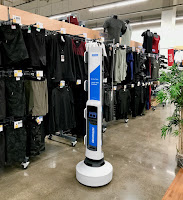Steven Levy, the venerable chronicler of Silicon Valley, got inside Google's (properly Alphabet's) "moonshot" Everyday Robots facility.
Everyday Robots is trying to do two really hard things, a challenge so hairy that some question whether the effort is worth it. The first is credibly performing the tasks of human helpers. Everyday Robots lives on the razor’s edge of Moravec’s paradox, which states that it’s relatively easy for computers to perform difficult cognitive work and devilishly difficult to duplicate the functions of a two-year-old. ... In the Everyday Robots world, conquering a mundane task, such as crossing a cluttered room and opening a tricky door handle, is like winning the Super Bowl. ...
The second hard thing the project is attempting to do is move toward that goal in such a way that it makes more sense, in terms of both economics and efficiency, to have a robot on hand than a bored and underpaid human. ...
On one hand, it’s astonishing to see these robots monitoring conference rooms and wiping tables. But then you ask yourself—why is Alphabet spending millions of dollars to perform chores that wouldn’t challenge a three-year-old? The corollary to Moravec’s paradox is Samuel Johnson’s unfortunate [make that misogynist] comparison of a woman preaching to a dog that walks on his hind legs: “It is not done well; but you are surprised to find it done at all,” said the 18th century writer ...
Two real tests need to be aced before everyday robots will be truly useful: They have to be cheap enough to be a cost-effective alternative to human labor, and they have to be flexible enough to cope with the near-infinite number of unplanned obstacles they will encounter in the chaotic reality that humans easily navigate. [E]ngineer Benjie Holson—he grew up in a family of puppeteers, acquiring a perspective that he says is helpful in his current job—admits that at this point, if the robots cleaning tables were supplied with soy sauce instead of disinfectant, they would blithely soil the surfaces with it. ...Definitely worth clicking through to Levy's article to see some cool, spooky videos.
This one was checking inventory in a store; at least I think that was its project. Would we feel better about these things if they were programmed to tell us what they are doing? We might. So far that doesn't seem to have occurred to their inventors.
And, of course, we have to be concerned about what happens to the people whose jobs will disappear -- even if I wouldn't want to spend my days checking inventory, for someone this job is a livelihood. If these things proliferate, we're sure to see some machine-sabotaging Luddite resistance.


No comments:
Post a Comment